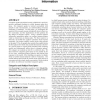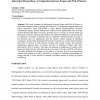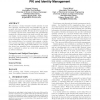319 search results - page 61 / 64 » Recommending collaboration with social networks: a comparati... |
WWW
2010
ACM
14 years 2 months ago
2010
ACM
Detecting clusters or communities in large real-world graphs such as large social or information networks is a problem of considerable interest. In practice, one typically chooses...
CORR
2011
Springer
12 years 11 months ago
2011
Springer
Despite recent advances in uncovering the quantitative features of stationary human activity patterns, many applications, from pandemic prediction to emergency response, require a...
ATAL
2008
Springer
13 years 9 months ago
2008
Springer
Computer agents participate in many collaborative and competitive multiagent domains in which humans make decisions. For computer agents to interact successfully with people in su...
CORR
2008
Springer
13 years 6 months ago
2008
Springer
: This study examines the differences between Scopus and Web of Science in the citation counting, citation ranking, and h-index of 22 top human-computer interaction (HCI) researche...
IDTRUST
2009
ACM
14 years 2 months ago
2009
ACM
We introduce a formal semantics based calculus of trust that explicitly represents trust and quantifies the risk associated with trust in public key infrastructure (PKI) and iden...



